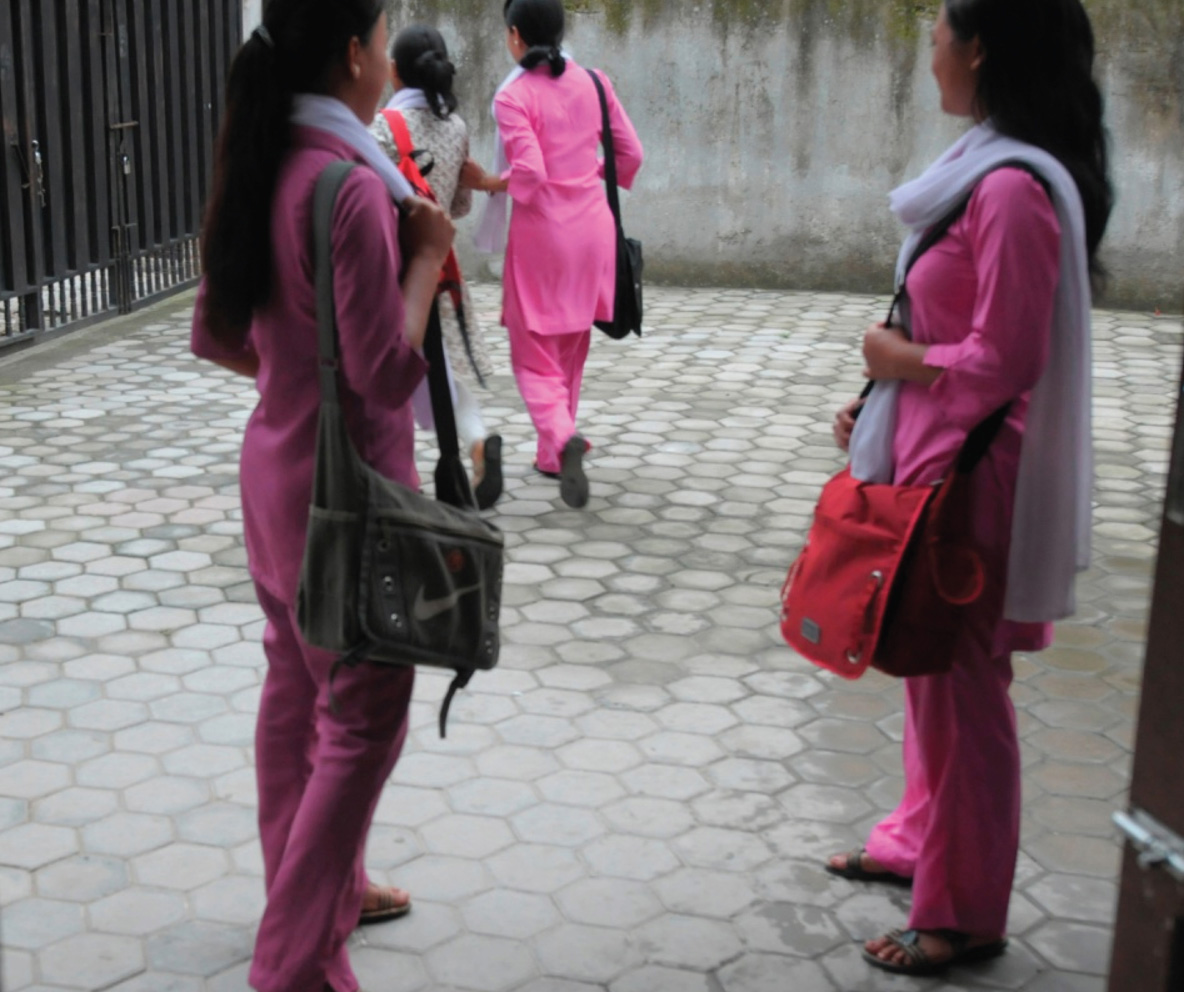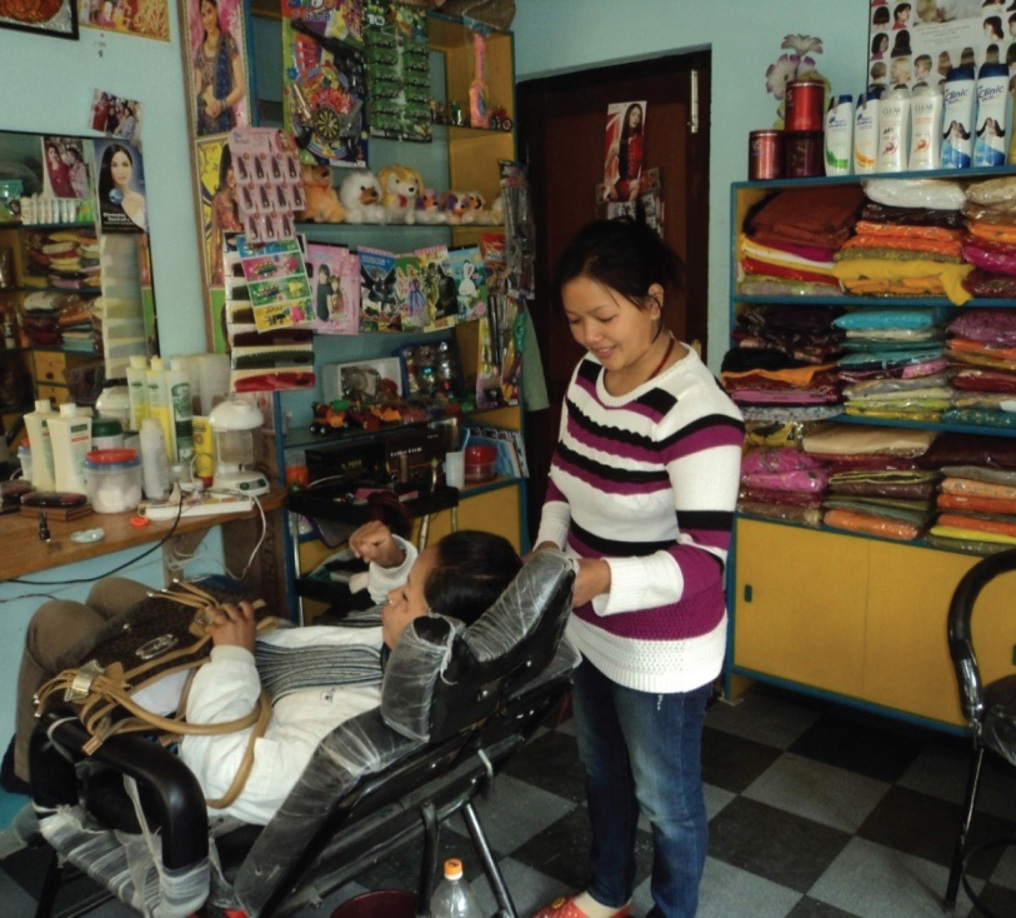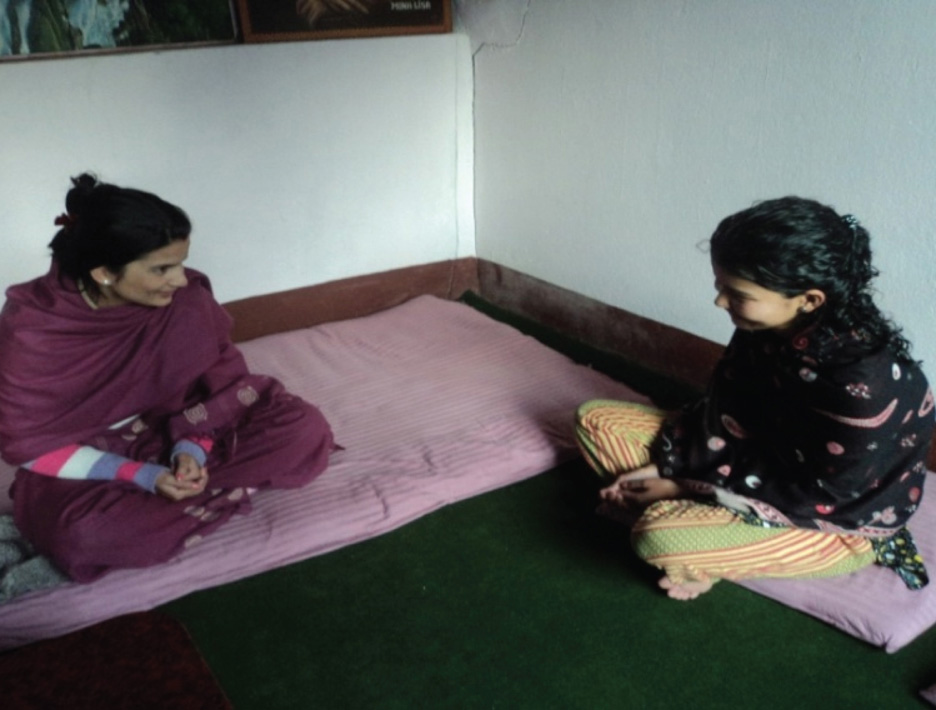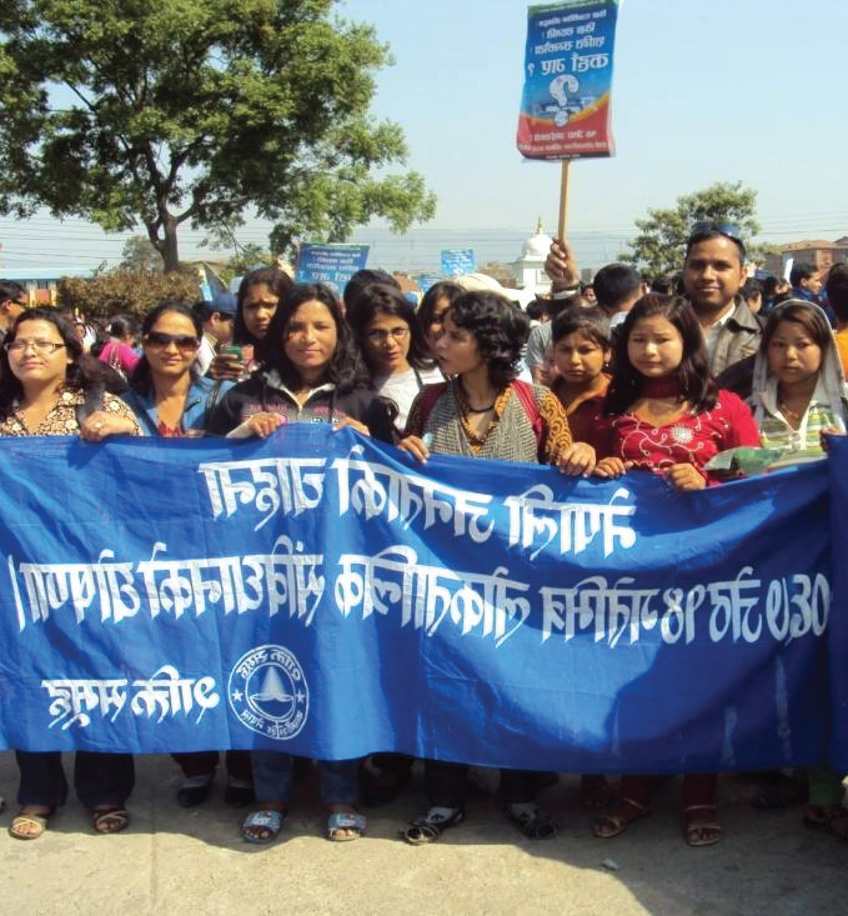Shakti Samuha, Nepal: From trafficking survivors to advocates for human rights - The process of recovery and empowerment
(Summary of interviews of Carolin Rehm with two trafficking survivors who are leaders of the anti-trafficking movement in Nepal today.)
Shakti Samuha is the outcome of women’s empowerment during recovery from human trafficking. In 1996 around 500 girls and women were rescued from brothels in Mumbai, India- among them 148 Nepalese citizens. Upon repatriation they stayed at various NGO run shelters in Nepal as many had no contact with their families and those who had contacts were not accepted by their families and communities. Interestingly, the women at one of the shelters, following several intensive trainings, decided that they would form their own group. They realized that they were not to be blamed for having been trafficked. The idea that started at the WOREC (also a GAATW member organization) training workshop is a reality now. The motivation of 15 women to start claiming their rights, to collectivise and to raise their voices against injustice has created and sustained what we now know as Shakti Samuha. The group registered as an NGO in 2000. Shakti Samuha is recognized as the world’s first NGO established and run by trafficking survivors according to the TIP Report 2007[1].
All board members and most of the staff members are survivors. Today they are leading Shakti Samuha’s anti-human trafficking work - but what challenges they had to overcome in their past and what are still the hurdles? What empowered them in their past and what gives them the strength today? What in their experienced perspective, are the important elements in the empowerment process of survivors to become advocates of human rights? These were some of the issues discussed in the interview with two survivor-activists of Shakti Samuha.
 Anita[2] is today 26 years old, studies English and Sociology in her third year of Bachelor’s Degree and with Shakti Samuha’s support has been working for six years in an NGO which also works against human trafficking . Her life was not so well organized in the past as it is today. She talks about social exclusion from mainstream society and institutions such as school or private job enterprises which she experienced as a trafficked person. “When I returned home friends and villagers stayed away from me. Parents did not allow their daughters and sons to meet with me. It was impossible for me to live in my own home.” Through her own initiative Anita managed to be with her aunt where she struggled to complete her school education and eventually passed the School Leaving Certificate Examination.
Anita[2] is today 26 years old, studies English and Sociology in her third year of Bachelor’s Degree and with Shakti Samuha’s support has been working for six years in an NGO which also works against human trafficking . Her life was not so well organized in the past as it is today. She talks about social exclusion from mainstream society and institutions such as school or private job enterprises which she experienced as a trafficked person. “When I returned home friends and villagers stayed away from me. Parents did not allow their daughters and sons to meet with me. It was impossible for me to live in my own home.” Through her own initiative Anita managed to be with her aunt where she struggled to complete her school education and eventually passed the School Leaving Certificate Examination.
 When I had a High School Certificate and a job with an NGO people began to treat me differently.” This big change was possible largely because of Anita’s strong determination and the support of her family and various NGOs. “I felt that lack of education and training was one of the main reasons behind my becoming a victim of trafficking. That was why I was determined to complete at least my school certificate. My family could not support me financially but they encouraged me morally. From my aunt I received the inspiration and initial financial support. Later I worked for different NGOs who provided me some financial support and many opportunities to gain vocational experience.” Today Anita still faces threats from her former traffickers, social discrimination and the challenge to meet her daily needs and take care of educational expenses. But her attitude towards such hurdles has changed. “Nowadays I am ready to fight, to argue and to debate against threats and stigmatization. I know that it was not my fault to be trafficked. We should blame the social constraints and the inability of the state to have an effective mechanism to address the problem of human trafficking. I am part of the Shakti Samuha team which inspires me. I have a job now, if I will lose it I am confident that I will find another job somewhere. I do not feel depressed anymore.” Anita is clear in her message and he life is an example of her values: “It is not necessary to tell everyone our stories while may evoke stigmatization. We are trafficking survivors but no less capable than others in society”.
When I had a High School Certificate and a job with an NGO people began to treat me differently.” This big change was possible largely because of Anita’s strong determination and the support of her family and various NGOs. “I felt that lack of education and training was one of the main reasons behind my becoming a victim of trafficking. That was why I was determined to complete at least my school certificate. My family could not support me financially but they encouraged me morally. From my aunt I received the inspiration and initial financial support. Later I worked for different NGOs who provided me some financial support and many opportunities to gain vocational experience.” Today Anita still faces threats from her former traffickers, social discrimination and the challenge to meet her daily needs and take care of educational expenses. But her attitude towards such hurdles has changed. “Nowadays I am ready to fight, to argue and to debate against threats and stigmatization. I know that it was not my fault to be trafficked. We should blame the social constraints and the inability of the state to have an effective mechanism to address the problem of human trafficking. I am part of the Shakti Samuha team which inspires me. I have a job now, if I will lose it I am confident that I will find another job somewhere. I do not feel depressed anymore.” Anita is clear in her message and he life is an example of her values: “It is not necessary to tell everyone our stories while may evoke stigmatization. We are trafficking survivors but no less capable than others in society”.
The combination of education support, financial support, psychological support and most importantly the sense of being part of a collective like Shakti Samuha creates a sense of empowerment in the preson and helps her meet the everyday challenges of society.
This understanding is also shared also by Puspa. She has been working with Shakti Samuha since 2010. Today she is managing a family, goes to work and is about to complete her School Leaving Certificate. In her childhood serious economic problems and the traditional belief that educating, girls was unnecessary, prevented her from going to school. “I could not avail of many opportunities simply because I had no education and no training.” When she was trafficked she tried to fight, to escape, to cry for help but not even the police supported her. She lost hope, could not trust anyone and started hating herself. After her rescue from an Indian brothel she faced severe social exclusion and discrimination. Her life story was published in the media. When news reached her village her whole family was ostracized. Health problems, lack of family support and the expulsion from her first job created a crisis. “I was blank. I did not see any reason to live.”
 At this time Puspa received health care, educational and vocational training and the access to counseling. It helped her regain faith in her own self and encourages her to go forward. “My way of thinking changed. I developed hopes, the will and the strength to work something. The start in a new job was my lucky break. It solved my economic problems and kept me busy. There was no time anymore to get stuck in the thoughts of my past.” Today her life is still challenging. Puspa cares for her young child, her sick mother and her sisters. Meeting the needs of her family with her meager income is a real challenge but she has the zeal to try her best. “We always have to try. It is the best we can do. We have to unite against the challenges and discrimination in society!” She is grateful to Shakti Samuha and the collective spirit it represents. She is motivated to carry on with her anti-human trafficking work. “Everyone in society needs to have a sense of responsibility to address the problem of human trafficking. We have to build a society that respects all people, reduce the discrimination, educate our daughters equally as our sons and implement the policies that are made.”
At this time Puspa received health care, educational and vocational training and the access to counseling. It helped her regain faith in her own self and encourages her to go forward. “My way of thinking changed. I developed hopes, the will and the strength to work something. The start in a new job was my lucky break. It solved my economic problems and kept me busy. There was no time anymore to get stuck in the thoughts of my past.” Today her life is still challenging. Puspa cares for her young child, her sick mother and her sisters. Meeting the needs of her family with her meager income is a real challenge but she has the zeal to try her best. “We always have to try. It is the best we can do. We have to unite against the challenges and discrimination in society!” She is grateful to Shakti Samuha and the collective spirit it represents. She is motivated to carry on with her anti-human trafficking work. “Everyone in society needs to have a sense of responsibility to address the problem of human trafficking. We have to build a society that respects all people, reduce the discrimination, educate our daughters equally as our sons and implement the policies that are made.”
 Anita and Puspa, both are part of the Shakti Samuha team, both are working against human trafficking and for the empowerment of survivors. Both say they gain the daily motivation from their own experiences and the encouragement from the team Shakti Samuha has established. Anita feels strongly connected with other survivors who she provides orientation to. The development and improvement of her service users pushes her to go on in her work and in her own education. Puspa maintains the family like working environment of Shakti Samuha. “Everyone has his/her own responsibility and working area but we are one cooperative team. Our way of supporting each other unites us as a group and empowers us as individuals.”
Anita and Puspa, both are part of the Shakti Samuha team, both are working against human trafficking and for the empowerment of survivors. Both say they gain the daily motivation from their own experiences and the encouragement from the team Shakti Samuha has established. Anita feels strongly connected with other survivors who she provides orientation to. The development and improvement of her service users pushes her to go on in her work and in her own education. Puspa maintains the family like working environment of Shakti Samuha. “Everyone has his/her own responsibility and working area but we are one cooperative team. Our way of supporting each other unites us as a group and empowers us as individuals.”
On the background of their own process of recovery as well as their daily work experience Anita and Puspa point out four main aspects for an effective empowerment of trafficking survivors. According to the both interviewees, first of all professional counseling for mental health should be provided. Secondly a sustainable livelihood needs to be established. In addition to secure livelihood options formal and informal education including life skills and vocational training need to be provided. And finally the rehabilitation and recovery support must include the families and communities. This is required regularly after the rescue of the person.
The process of recovery and empowerment is not a straight line, it is marked by progress and regress and by encouragement and discouragement. As an organization that believes in women’s empowerment Shakti Samuha aims to bridge these ups and downs by creating a sense of unity among trafficking survivors, technical staff members and newly reached service users. Like the survivors that it supports, Shakti Samuha as an organization also faces many challenges. But it is the will to forge ahead as a collective against all odds that keeps the group going.
[1] U.S. Department of State (2007): Trafficking in Persons Report, p.39
[2] Name changed for confidentiality reasons.

